- California Assembly OKs highest minimum wage in nation
- S. Korea unveils first graphic cigarette warnings
- US joins with South Korea, Japan in bid to deter North Korea
- LPGA golfer Chun In-gee finally back in action
- S. Korea won’t be top seed in final World Cup qualification round
- US men’s soccer misses 2nd straight Olympics
- US back on track in qualifying with 4-0 win over Guatemala
- High-intensity workout injuries spawn cottage industry
- CDC expands range of Zika mosquitoes into parts of Northeast
- Who knew? ‘The Walking Dead’ is helping families connect
Hines Ward: The Legend Goes On
By Brian Han
Even after retiring from the National Football League, Hines Ward cannot be stopped.
After winning two Super Bowl Championships, a Super Bowl MVP and claiming the Pittsburgh Steelers’ All-Time Leading Receiver title for receptions, receiving touchdowns and yards, the 38-year-old former NFL star wide receiver keeps on looking for new challenges to conquer.
He’s forayed into endurance sports and finished his first World Ironman Championship last year. Before that, he won season 12 of Dancing with the Stars in 2011 with no prior dancing experience. And now, he’s beginning another chapter in his life as a sports broadcaster alongside legendary Bob Costas, Chris Collinsworth and Dan Patrick.
That’s who Hines Ward is. There’s something inside of Ward that gives him an infinite drive and when asked about it, he’ll humbly hand over all the credit to his mother.
As glamorous as his life may seem, it took a lot of emotional pain and anguish for him to achieve the level of success and confidence that brought him to this point in his career.
More specifically, Ward had difficulty coming to terms with his biracial background as he was growing up.
After turning one, Ward and his mother left South Korea to escape some of the xenophobic tendencies that existed in the country at the time. As Ward spent his childhood in Georgia, he quickly realized that the U.S. was not necessarily a safe haven from biracial discrimination.
Although he faced barriers while coming to grips with his identity, he eventually learned to fully embrace it.
As he began to reach adulthood, Ward began to appreciate his mother’s traditionally Korean parenting style. What he once tried so hard to suppress became a source of strength for him. The strict disciplinary measures his mother provided taught him that there’s no substitute for hard work whether it was in school, football and now a blossoming career in sports commentating.
Even with all the accomplishments, fame and respect Ward has earned over the years, he is still a humble man. He looks at his past fondly but looks towards the future with a willingness to learn and conquer the task ahead of him.
This is a similar lesson Ward tries to instill when he’s pursuing philanthropic endeavors. Through one of his charities, Helping Hands Korea Foundation, Ward not only raises awareness of biracial discrimination in South Korea, he also spends time mentoring the children who are victims by sharing his story.
Take an exclusive look into the mind of Hines Ward below as he discusses topics ranging from biracial discrimination to modern-day NFL controversies with The Korea Times:
Q: Since your charity began working towards helping biracial youth understand and develop their identities, have you learned anything about yourself in the process that you wouldn’t have otherwise?
HW: Yes, most definitely. Since I began my charity work with biracial and underprivileged youth, I’ve learned just how powerful my own story has been to those kids who have heard it and how much it has and can impact others. Before I got involved with my charity, I was almost embarrassed to talk about my own upbringing.
To me, it was tough. It was never like the upbringing my friends had. At first, I was embarrassed that I had a Korean mom. I was embarrassed that my friends all had to take off their shoes before coming into my house. It was tough when my mom spoke broken English to my friends and their parents and people couldn’t understand what she was saying or she couldn’t understand what they were saying.
But, at the same time, I wouldn’t have changed my life for anything. My mom is my hero. She is the reason why I am who I am today. When other kids were doing all the wrong things, I was doing all the right things because my mom wouldn’t have it any other way. She taught me to never quit on anything in life. She taught me the value of hard work, sacrifice and perseverance. Although she is a little woman, she ruled our house with a big presence. She is my rock.
So because of her teaching me the strict Korean way in America, I learned just how tough I can be both in football and in life. Working with other children with similar backgrounds as me, I have learned to appreciate more and more the value of my own biracial upbringing. And this has motivated me to reach out to biracial kids all over the world and let them know it’s OK to be the way you are. It’s a good thing. And I have learned to appreciate my own heritage more and more as I work with these kids in their struggles. Being biracial is not a curse. It is the best blessing God could have ever given me.
-
You’ve been known to excel at an array of new activities since retiring as a professional athlete. What are some things you want to accomplish in the next year? In five?
When I retired, I never wanted to be that guy who let himself go. Physically or mentally. So my agent Andrew Ree and I got together and discussed life strategy long before I actually retired. I have known Andrew (I call him Andy) for most of my life, and he knows me really well. He and I talked about the fact that I will always be a competitor, so he wanted to challenge me in every aspect of life after football.
That’s why I did “Batman: The Dark Knight Rises” and “The Walking Dead.” I wanted to see if I could act. Even though I had no speaking part, I had a lot of fun with my touchdown run in the movie while the field blew up all around me and playing a zombie on cable TV’s No. 1 show. I then did the Food Network’s “Rachel v. Guy: Celebrity Cookoff.” I wanted to show the world that I could do more than play football. That I could be a pretty good competitor in the kitchen too. I made it all the way to the semi-finals and lost to a guy with a lot of cooking experience. So I was happy with that opportunity.
And of course, right before I retired I did “Dancing with the Stars.” That was one of the hardest things I have ever done. I had no dance experience whatsoever. I didn’t even go to my own high school prom because I was afraid of dancing. But, again, with the competitive nature deep inside of me, I worked many long and hard hours and I was fortunate enough to win my season (Season 12) against some pretty tough competition.
Most recently, I did the “2013 World Ironman Championships” in Kona, Hawaii. This was definitely the most difficult thing I have ever done. Being a football player, I was used to fast twitch, short burst physical activity. With the Ironman, I had to adjust my entire way of thinking because it is the ultimate endurance sport. I was just happy to finish that one and am proud to now be able to call myself an Ironman.
About this coming year? I really want to do my best to focus all my time and energy on developing my broadcast career for now. There are so many good broadcasters out there today, and I am blessed to be working with the Godfather of them all in Bob Costas. So I am not looking for any other challenges at the moment, but I’m sure if my agent brings me one, I won’t decline it.
For the next 5 years? I’m really not sure yet. I know that eventually I would love to get into coaching. I have had a few offers but have turned them down for now. So I guess you will have to stay tuned to find out.
-
Has your childhood shaped your philosophy on parenting? If so, how?
Most definitely. I watched my friends growing up and it was different seeing them with their parents. But I also saw lots of my friends do a lot of bad things and wondered what their parents thought. I grew up in a single parent home with just my mom and me. My dad was really never in the picture. So the only parent I had was my mom. She was my dad, my mom, my teacher…she was everything to me.
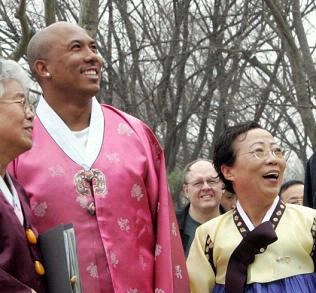
Hines Ward gets in touch with his Korean half while wearing hanbok, a traditional South Korean outfit. (Yonhap)
I remember one day I got in trouble at school. The principal called my mom, and my mom told the school that she would be right there. My mom walked straight into my classroom, all maybe 4-foot-10 of her, and she paddled me right in front of all my classmates. My mom didn’t play. She wanted to teach me a lesson I would never forget, and I have never forgotten it since.
I have one son, and before he came along, I had always told myself that I never wanted my child to be without a father, like I was. I felt bad for my mom because she had to do everything by herself. And that affected me too. But it worked out well for her and me. So my philosophy on parenting is similar to what my mom taught me. I will teach my son to be tough, hard working, never quit, and stay humble, no matter what. I will teach him the importance of self-sacrifice.
I guess you could say I will teach my son the “Korean” way when it comes to discipline and education. It worked well for me. And I’m sure it will work well for him. I will always show him that I love him by being there for him as he grows up. I don’t ever want him to think otherwise.
-
You are known as one of the best blocking receivers in the NFL during your time playing in the league — an intangible that isn’t readily picked up by those unfamiliar with your career. Are there things that South Koreans surprised you with in terms of their knowledge of you? Additionally, were there times that their appreciation of you seemed based on fame rather than achievements?
Growing up, I really didn’t like Korean people. I felt that way because of the way they treated my mom because of me. She had told me stories of how they discriminated against her because she had a mixed blood son. It really hurt her and so it really hurt me.
That’s the reason my mom left Korea: so she could give me a better life, a level playing field. And that’s why I will always love, respect and honor my mom. She left everything that she knew, that she called “home” in South Korea to come to a foreign country where she didn’t even speak the language to give me a better life. So she sacrificed her entire life, relationships, worked three jobs, kept the house, and took care of me, so that that I wouldn’t have to suffer or experience the discrimination that she suffered in Korea. That always blows my mind to think about that.
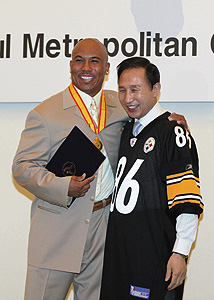
The entirety of Korea, including then-President Lee Myung-bak, embraced Hines Ward after he won the Super Bowl MVP trophy. (Korea Times file)
So I didn’t really associate with any Korean people growing up because of how my mom was treated in her own country. So when I won the Super Bowl XL MVP, that’s when I heard that Korean people were calling out my name and cheering me on. I was really confused and shocked at this. At that time, Andy (my agent) told me that his emails were blowing up from all over Korea.
At first I was very cautious about all of this and felt that it was only because I won the SB XL MVP on national television in front of the whole world. I mean, I don’t think that Korean people even knew who I was before this. But then, all of a sudden, they find out I was born in Seoul, and I start seeing Korean kids wearing my “86″ jersey all over the place. It was crazy.
But then, when I took my first trip to Korea since my birth, right after I won the SB XL MVP, I was surprised at how the support from the entire country of South Korea showed up from the minute I landed to the minute I left. Everyone from little kids to the mayor of Seoul to the president of the country came out to thank me. And all I could think of was, “Thank me for what?”
Then I was told something by a high-ranking member of Kia Motors during a private dinner that brought it all together for me: He told me that the entire country of Korea was very proud of me, as a Korean, for the way I accepted the Super Bowl MVP trophy. He said when I dedicated it and all I had accomplished to my mom, the entire country of South Korea cheered because of the humility and gratitude I gave to my mom, the parent who raised me.
He said that in today’s society, Korean kids are becoming more and more rebellious in their behavior and attitudes. He told me it didn’t used to be like that. He said that I brought the entire nation back to the days when kids would show complete respect and honor to their parents. And for that, he thanked me.
I was really humbled by what he said. I was beginning to see how my Korean heritage and culture saw things. And I began to start feeling pride in my Korean side. This pride really increased when I received an honorary citizenship from the mayor of Seoul in front of thousands of people. I was so touched by that and by seeing the entire city of Seoul come out to thank and support me that it was at that time that I actually apologized to the Korean people for the bitterness and distrust I had had for all those years.
I think that first trip to Korea in 2006 really changed how my mom and I both felt about Korean people. I have forgiven and so has my mom. It was an experience I will never forget.
-
How have you been enjoying your new role as a sports commentator? Are you starting to pick things up about the game looking at it from a different analytical perspective?
It’s been fun, but at the same time, very challenging.
I never knew how much precision, timing, and organized thought was required in broadcasting. It’s really an art, and I am anxious to get better at it. When I first became a broadcaster, I thought it would be so easy. I mean, I knew the game of football inside and out. What could be so hard?
But when I actually started doing it, I couldn’t believe how much time goes into a 30-minute or hour-long broadcast. The production meetings, the topic selection, the timing, mic ques, etc. There is a lot involved with what I now do. And I can see why Football Night in America and Sunday Night Football is the No. 1 sports show in the country.
I am so proud to be part of the “Mt. Rushmore” of broadcasters in Bob Costas, Chris Collingsworth, Dan Patrick and the gang. I still have so much to learn about the broadcasting part. As far as the game goes, I already know that part. So it’s not the game itself that I need to learn and analyze, it’s more the matchups each week between teams and the concise way in which I need to present it that I am always studying and evaluating.
I have a long way to go to be considered great or even good, and it’s been a truly humbling experience for me so far. But the way I look at it: It’s one more challenge that I am ready to face, take on and ultimately win.
-
After playing as a highly capable quarterback in high school, what was it like transitioning to wide receiver? Do you think your knowledge of the quarterback position gave you a competitive edge when you transitioned?
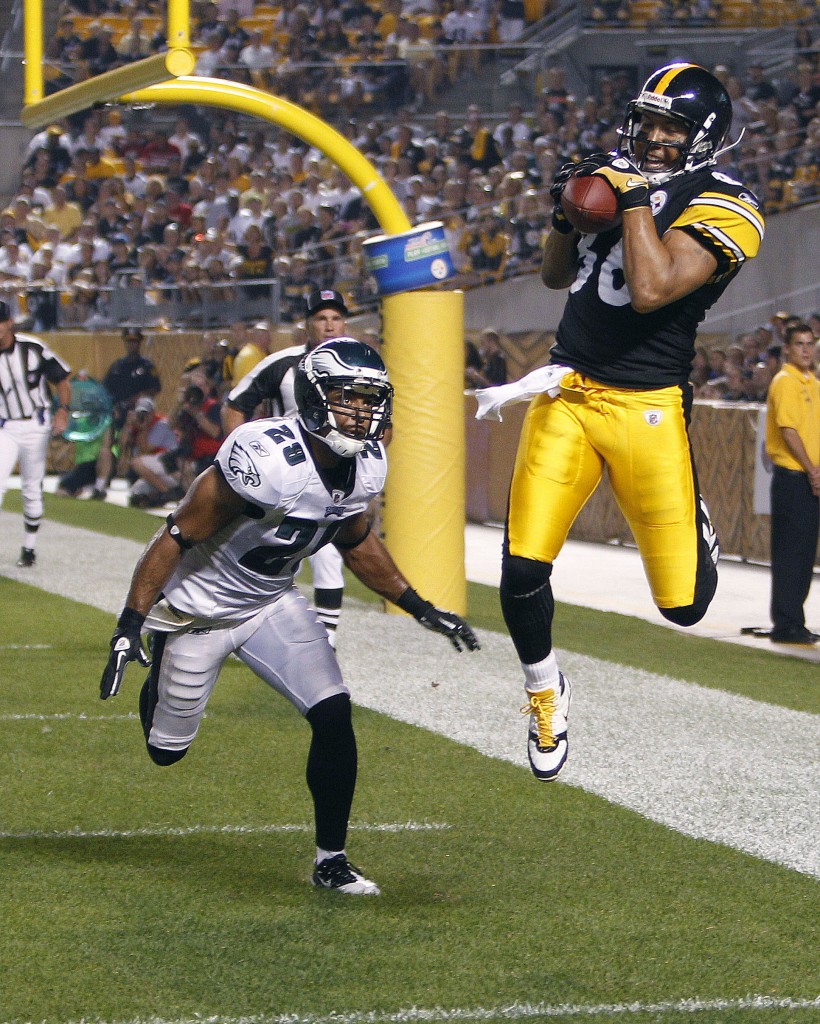
Hines Ward played a multitude of positions for his high school football team, but capitalized on his strengths as a wide receiver to eventually receive the Superbowl MVP award in 2006 (AP Photo/Gene J. Puskar)
I actually played quarterback, running back and wide receiver in college at the University of Georgia. So you can imagine how hard that was going from position to position to position to help my team win. It wasn’t easy. Each position has its own unique style, technique and strategy.
Fortunately, my coaches felt that I was blessed with enough pure athleticism and that I was capable of playing all three positions when necessary. Transitioning from quarterback to wide receiver wasn’t really that difficult. Having played quarterback, I knew what was necessary to be a good wide receiver because I was the one throwing to them all the time.
Transitioning to wide receiver, I knew I had to really nail down my route-running ability. I was never the fastest guy or the biggest guy, or even the strongest guy on the field. So I knew that my technique at route-running, that ability to get open, was critical to my success at the wide receiver position.
So at the end of my sophomore year, I went to my head coach and asked him if he could transition me to wide receiver. I knew that because of my height, I would not last or even make it in the NFL as an elite quarterback. I also knew that I wasn’t big enough to make it as a running back either. My frame couldn’t take that kind of smash mouth pounding every week.
I knew the only way I could possibly make it in the NFL was at the wide receiver position. And I am grateful to my head coach for giving me that opportunity at Georgia.
-
Are you still taking annual trips to South Korea? What is your favorite part about the culture? Did you ever feel a sense of culture shock?
No, not as often as I would like to because my rigorous NBC travel schedule has prevented me from doing so.
As part of the Sunday Night crew, I have to fly to each Sunday night venue where Bob and I do the pregame and half time shows. And in my offseasons, I am busy going back and forth to Pittsburgh as I prepare myself for the upcoming football seasons.
I would eventually like to make more annual trips as before, but for now, until I can stabilize my NBC broadcast career, I won’t be able to go back every year. But I will go to Korea any chance I get.
My favorite part of the Korean culture? I would have to say it’s the food. I love Korean food and I go eat Korean barbecue at least once a week with my wife and son. I have always loved Korean food because that’s what my mom always fed me growing up. My mom makes the best Korean chicken wings and kulbi around my area.
Even my teammates on the Steelers, Jerome Bettis and Troy Polamalu, love my mom’s Korean cooking. And they also learned to take their shoes off when coming to my house (my mom lives with me).
I never really felt culture shock going to Korea because I was raised Korean by my mom. So I think it was easier for me to adapt when I was finally able to go there and the people made me feel very comfortable there as well.
-
America is known for its ethnic diversity, a trait that a lot of other countries, including South Korea, lacks. For those growing up biracial in countries like South Korea who may face even more difficulties coming to terms with their identities, what words of advice do you have for them?
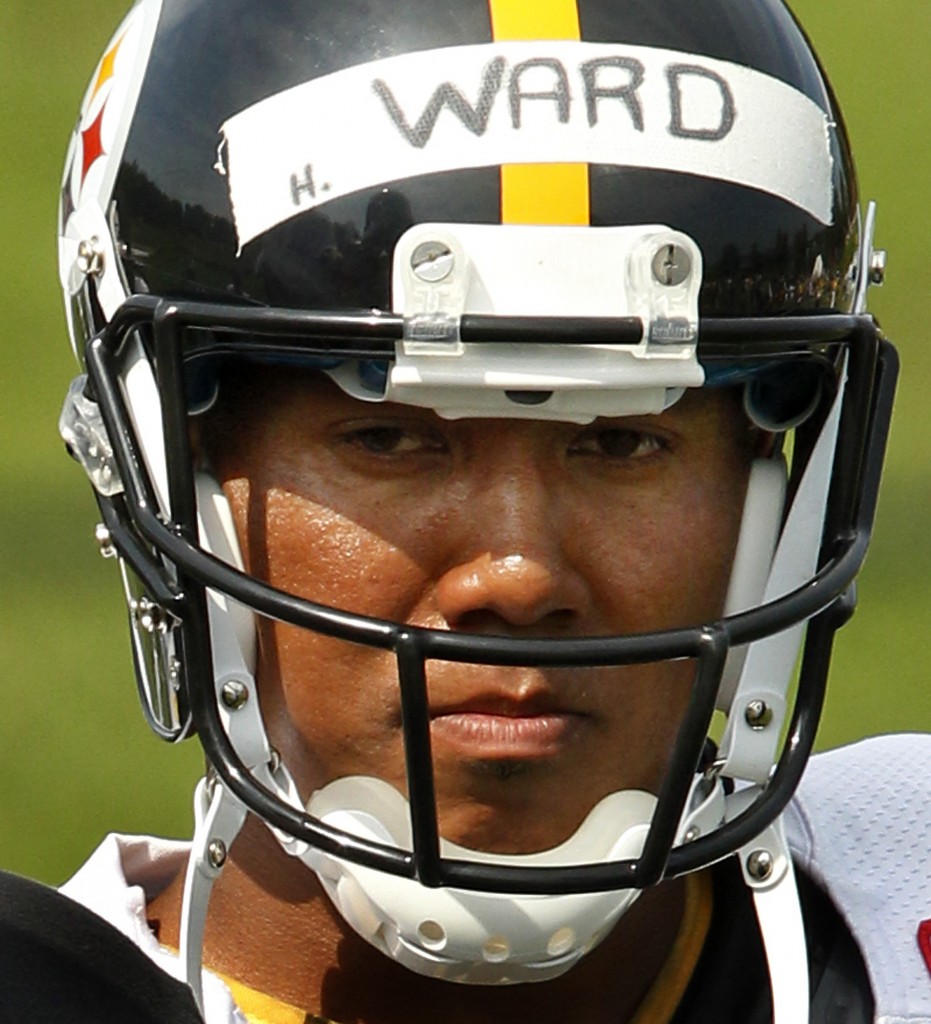
Hines Ward says, “I look at my name ‘WARD’ and I see the meaning ‘Will Always Rise Above Difficulty.’”
It’s like I tell all kids: Never give up on yourself because of what others say.
I tell them my own stories of being bullied and called “Bruce Leroy” or “Jackie Chan.” I didn’t ask to be made Korean and African American. God made me that way, and I embrace my biracial-ness. And instead of being down on myself because of what others say, I am going to “rise above” all the negativity.
I look at my name “WARD” and I see the meaning “Will Always Rise Above Difficulty.” And that’s how I approach everything in life. The first thing I tell kids is to cut out all the negativity in their lives, whether it be friends, family members, or others on the street.
Negativity breeds more negativity. And it gets you nowhere in life. All you have left from there is to go up in life. So when you are feeling bullied or picked on because of your race, do what I did, and use that negativity as a chip on your shoulder to rise above it. Knock that chip off your shoulder with your hard work, dedication, perseverance, and never quit attitude.
And stay humble in the process. My mom always told me that there will always be someone else better, bigger, smarter than you. But you can always gain the respect of others if you keep working harder than everyone else. So turn difficulties into success. Negatives into positives. And never give up on your dreams in the process. That’s my underlying message to those biracial kids all over the world.
-
Looking back on your life at this point, what are you most thankful for?
That’s a tough question because I am thankful for many things.
It starts with my mom. I am most thankful to her for the way she raised me. The way she never gave up on me or herself and the way she taught me to never give up on myself. She is and will always be the most amazing person in my life.
I am also thankful to God for blessing me with the ability to play football and sports in general. Sports was my outlet. My way of fitting in. Performing well earned me the respect of my peers. I am also thankful to the country of Korea and all Korean people.
I thank Korea for giving me my mom and I thank Koreans everywhere for their continued support and encouragement to me even now as I am retired. Thanks to all their support, I am very proud of my Korean heritage. And I can’t go without saying how thankful I am to the Pittsburgh Steelers, owner Dan Rooney (and his son Art Rooney, III), Coach Cowher, and the entire city of Pittsburgh for giving this small town country boy from Forest Park, Georgia, a chance. A chance to live out my dreams.
I look at my life as a modern Forrest Gump. I can’t explain how or why I got to do all the things I have done in my short life. I can say that I am very grateful for it all though.
-
With all the controversy and scrutiny the NFL is receiving off the field, how would you restore the respect the league has built over the decades if you were commissioner?
I am very disappointed in the decisions that those few guys in the league have made recently with respect to their personal lives. It’s embarrassing and I don’t condone any of that kind of behavior.
But I don’t want people to lose sight of all the good that many of the other guys in the league do. Overall, we have to be careful not to condemn the entire league for the shameful actions of a few.
For years, the NFL has given a lot back to our communities and has built a solid reputation. I don’t want people to forget that. That being said, I think that we as a league will survive all of this. I want to be respectful to our commissioner and the actions he is taking at this time.
I’m not going to second-guess his actions and the steps he is taking toward resolving these issues. I also want to be careful not to jump to conclusions when I don’t have all the information that he has as he makes these decisions. Hindsight is always 20/20. We will know in the coming weeks and months how the league will fair out during this sensitive time.
-
With the way Baltimore WR Steve Smith Sr. is dominating at age 35, do you ever think you had left too early or could have played well for a season or two more?
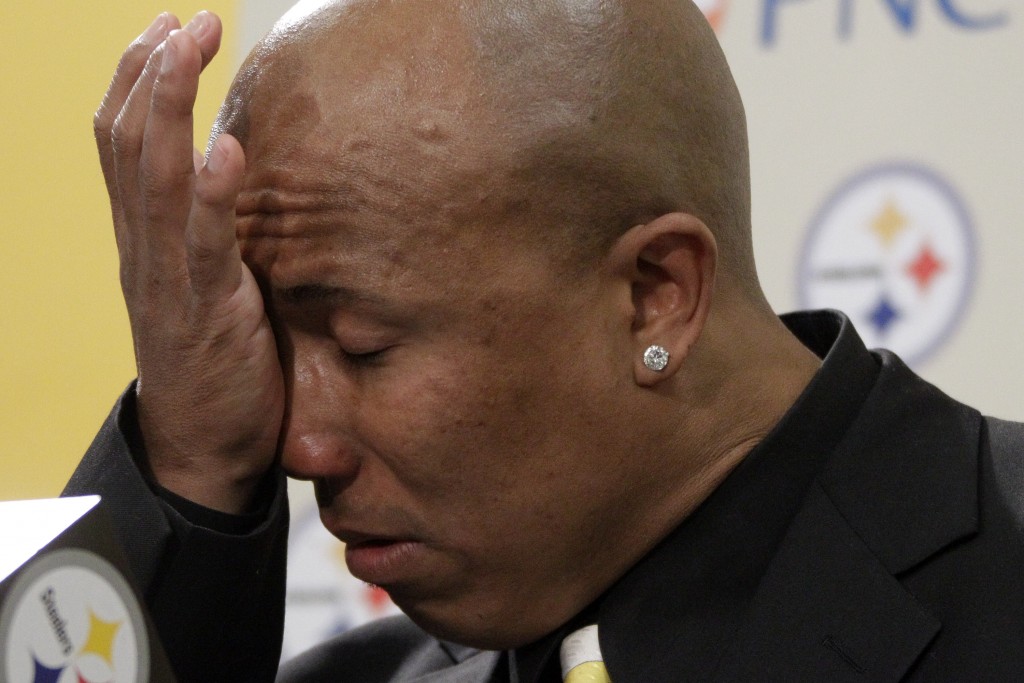
Hines Ward wipes his eye while announcing his retirement from the NFL in 2012. (AP Photo/Gene J. Puskar)
The decision to end my career was not mine.
If I had had my way, I would have played a year or two more. I always knew I had at least one more year to play the game. I was still in great shape and still able to contribute to my team. My love for the game was still there, and I was ready to go. But the Steelers decided that my time with the organization was up for reasons only they can answer.
When I was first released, I was angry. I wanted to show the Steelers that I could still play, so I was set to interview with other teams who had expressed interest in having me. But when I looked back over my 14 years of playing as a Steeler and talked to Andy about it, something inside of me said it wasn’t right.
My heart was telling me that somehow, I wouldn’t feel the same passion or desire for the game if I played it in a different uniform. I couldn’t do that to Steeler Nation or the organization. It was at that time that I knew I needed to retire a Pittsburgh Steeler. I wanted to.
As I stated in my retirement speech, “I will always remain a Pittsburgh Steeler. I will always bleed black and gold.”
Now, as I think back on that decision, I have no regrets. It was the right thing to do for me. It was the right thing to do for the Pittsburgh Steelers, the city of Pittsburgh, and all of Steeler Nation. I had already gotten everything I wanted out of football: four Pro Bowls, three Super Bowls, two Super Bowl Championships, Super Bowl MVP, Steelers’ All-Time Leading Receiver…I am satisfied. The timing was right.







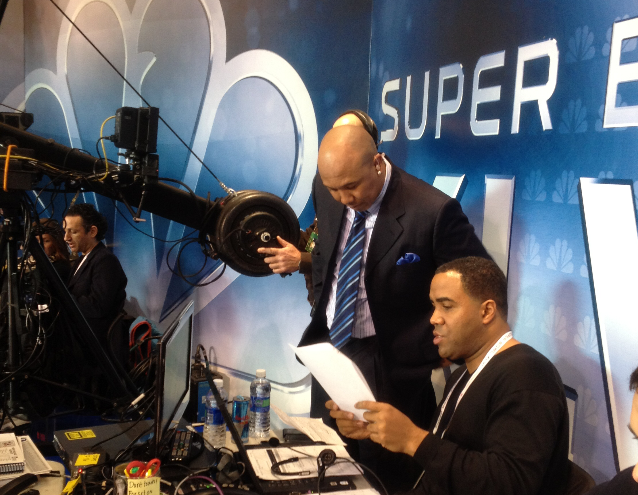
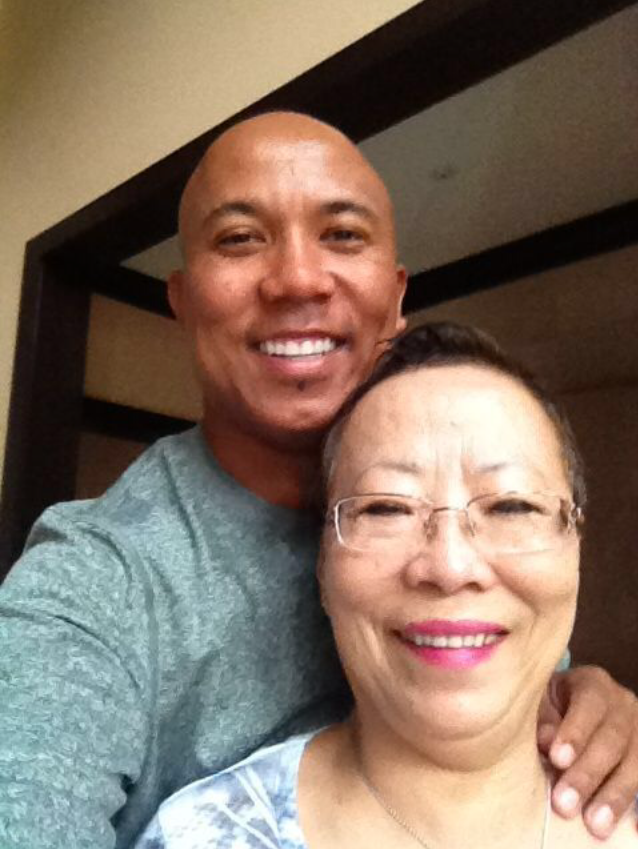
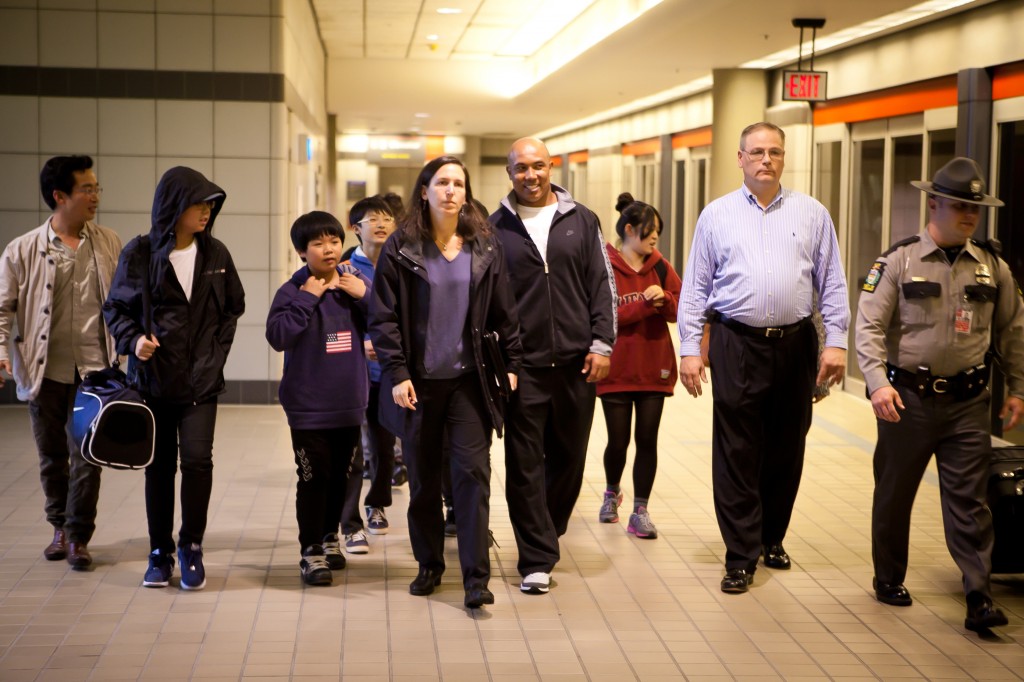
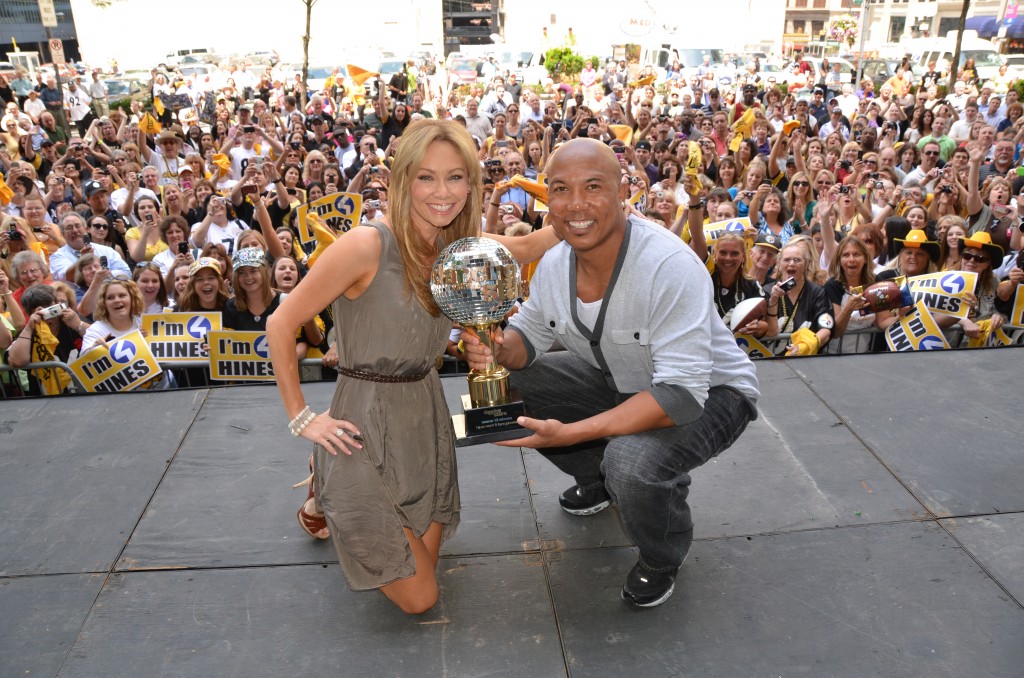





![일본 사도광산 [서경덕 교수 제공. 재판매 및 DB 금지]](http://www.koreatimesus.com/wp-content/uploads/2024/07/PYH2024072610800050400_P4-copy-120x134.jpg)



Pingback: Hines Ward: The Legend Goes On - InWayShoes
Pat
October 23, 2014 at 3:45 PM
Way to go bro!!! Very touching article. Keep up the good work!!!
Love,
Hyung
Cynthia Ward
October 24, 2014 at 2:44 AM
My last name is WARD also! I love the meaning “Will Always Rise Above Difficulty” I think I will borrow it! Love you Hines WARD!
Nancy Herrmann Blose
October 24, 2014 at 9:50 AM
And your Forest Park Family is very proud of you too. It was a pleasure to watch you mature in high school. You have a great Mother and I am glad you have taken care of her. We love you!
Paula Scholl
October 24, 2014 at 6:52 PM
I have been a Pittsburgh fan all my life and Hines you are my all time favorite Steeler. I hated to see you retire and wished that you could have played a few more years, but even so you left the game with so much class and style. The team is not the same without you and the love and passion that you have for the game made me so proud to be a fan. We (steeler nation) love you Hines! So glad you will ALWAYS be a Steeler!!
David Balgosky
October 24, 2014 at 8:57 PM
You will always be the best. I hope at some point you can coach as you will be the best in that as well.
Marianne Wages
October 24, 2014 at 9:23 PM
What a class act you are!! Right after you won Dancing with the Stsrs (which I was pulling for you all the way) , I passed you coming into Target as I was going out and I was thrilled to see you in person. I was thinking, “ThAt was Hines Ward!!! Wow!!”
Joshua
October 24, 2014 at 10:56 PM
Well done in this article!
I am a Pittsburgh native living in LA and learning the Korean language. I have my 86 jersey and was also in the same scene as Mr. Ward was in The Dark Knight Rises.
Great STEELER, analyst, and person. I look forward to meeting him one day!
Mary E Carr
October 25, 2014 at 6:48 AM
Hines Ward has always been one of my favorite players, although I’m not a Steelers fan per se, and now I am even more of a fan after reading this article. I remember the documentary that aired when he went to visit Korea, and that touched me. It is actually refreshing to be a fan of an athlete and have him be that person you can admire. Nowadays it is so disappointing to be a fan and find out that athlete is not the person you thought they were. Love you Hines Ward! Thank you for being you!
Pingback: The Walking Dead 86 Cbr English | Best Tv Shows Ever
Pingback: The Walking Dead 86 Cbr English | Schedule - Best TV shows ever
Dress Up
November 11, 2016 at 3:01 AM
Norwich, New York (NY 13815) profile: population, maps …